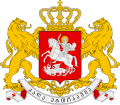 | |
| Parliament of Georgia | |
|---|---|
| |
| Territorial extent | |
| Signed by | Chairperson of the Parliament of Georgia Shalva Papuashvili |
| Signed | 3 October 2024 |
| Legislative history | |
| Committee responsible | Legal Issues Committee |
| First reading | 27 June 2024 |
| Voting summary |
|
| Second reading | 4 September 2024 |
| Voting summary |
|
| Third reading | 17 September 2024 |
| Voting summary |
|
| Status: In force | |
The Georgian LGBT propaganda law[1] (Georgian: საქართველოს კანონი ლგბტ პროპაგანდის წინააღმდეგ, romanized: sakartvelos k'anoni lgbt' p'rop'agandis ts'inaaghmdeg), formally the Law on Family Values and Protection of Minors[2] (Georgian: საქართველოს კანონი ოჯახური ღირებულებებისა და არასრულწლოვნების დაცვის შესახებ, romanized: sakartvelos k'anoni ojakhuri ghirebulebebisa da arasrults'lovnebis datsvis shesakheb), is a legislative package in Georgia that was passed with the third and final reading by the Parliament of Georgia on 17 September 2024 and was signed into effect on 3 October 2024.[3] Its introduction was announced by the Chairman of Georgian Parliament Shalva Papuashvili on 4 June. The package consists of the "core law", the Law on Family Values and Protection of Minors, and 18 amendments which modified various existing laws in Georgia, including the Civil Code, the Labor Code, the General Education Act and etc.[4]
The legislation was supported by the ruling Georgian Dream party, its ally People's Power, and the pro-government European Socialists party. The bill's voting was boycotted by opposition parties, except Girchi, which attended the session and criticized the bill.[5] The opposition For Georgia party, while not attending the parliamentary discussion, still voiced partial support for the bill.[6] Georgian President Salome Zourabichvili refused to sign the bill, returning it to the Georgian Parliament, after which Chairman of Georgian Parliament Shalva Papuashvili signed the bill into the law.[3][7] The bill was met by international condemnation from Western countries and organizations such as the EU and US. The EU described the bill as "harmful" and stated that it was considering stripping Georgians of visa free travel to the EU and freezing other agreements such as EU candidacy following the passage of the bill. While most of Georgians support the European integration, most Georgians at the same time have negative opinion on the LGBT movement and consider homosexuality to be unacceptable.[8][9] Following EU, the US likewise sanctioned various members of the Georgian parliament following passage of the bill.[10][11][12] The legislation has been compared to similar laws in Bulgaria[13] and Russia.[14]
- ^ Cite error: The named reference
firstwas invoked but never defined (see the help page). - ^ "Parliament backs draft law on Family Values and Protection of Minors in 2nd reading". 1st Channel of Georgia. 4 September 2024.
- ^ a b "Speaker signs Family Values Law: Massive mobilization on May 17 reflects Georgian support for legislation". 1st channel of Georgia. 3 October 2024.
- ^ ""ოცნება" "ოჯახური ღირებულებების" დაცვისთვის 19 კანონში ცვლილებას აინიცირებს - დეტალები". Business Media. 4 June 2024.
- ^ Cite error: The named reference
radiowas invoked but never defined (see the help page). - ^ Cite error: The named reference
forwas invoked but never defined (see the help page). - ^ "President returns Family Values and Protection of Minors bill to Parliament without signature". 1st Channel of Georgia. 2 October 2024.
- ^ Cite error: The named reference
socwas invoked but never defined (see the help page). - ^ Cite error: The named reference
WVSwas invoked but never defined (see the help page). - ^ "EU could strip Georgians of visa-free access over backsliding on democracy". POLITICO. September 19, 2024.
- ^ Light, Felix. "Georgian parliament approves law curbing LGBT rights" – via Reuters.
- ^ Bondarenko, Veronika (September 19, 2024). "The European Union considers limiting this country's citizens' travel". TheStreet.
- ^ "Bulgaria's new anti-LGBTQ+ law is official. Opponents beg EU to take action". Politico. 16 August 2024.
- ^ "Georgian parliament approves anti-LGBTQ legislation, echoing measures in Russia". Citrus County Chronicle. 17 September 2024.